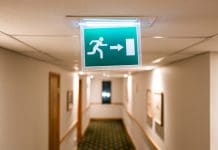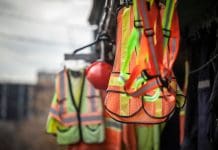The British Occupational Hygiene Society has warned that “education, proper workplace controls and awareness” will be more effective at saving lives than a ban on engineered stone
As companies in the UK start to follow Australia’s lead in banning engineered stone worktops, the British Occupational Hygiene Society (BOHS) has argued in favour of more moderate, widespread measures.
UK kitchen company Herringbone was the first to ban the sale of high-silica quartz worktops, a popular type of kitchen surface, which can expose stonemasons to tiny crystalline particles of silica when working with the engineered stone.
The dust from engineered stone can severely impact lung health
This exposure increases the risk of contracting silicosis, which is almost impossible to treat effectively.
According to a university study, over ten thousand Australian stonemasons are expected to be diagnosed with lung cancer as a result of their exposure to silica dust.
The disease is easily preventable using standard controls, such as water suppression of dust, but is almost impossible to treat effectively.
Misdiagnosis is thought to affect the number of cases
The UK, which is home to the largest engineered stone factory in Europe, is seeing a rise in both the use of engineered stone and cases of silicosis.
More cases are expected to be found as medical understanding improves and misdiagnosis becomes less common.
BOHS president, Alex Wilson explains: “Sadly, there is reasonable probability that the there are more cases that have not been detected or reported. Accurate diagnosis of silicosis is difficult and it can easily mistaken for a more common complaint, sarcoidosis, for example.”
“It’s an old problem in a new and nasty guise. Like so many occupational diseases, it is really quite easy to prevent, but impossible to cure. It’s vital that anyone potentially being exposed in the engineered stone industry has access to appropriate medical surveillance, but more importantly, it’s vital that proper dust controls are used at all times. Anyone who isn’t sure if their controls are good enough needs to get expert advice from an occupational hygienist.”
The BOHS chief executive suggests that an engineered stone ban may not be necessary with greater industry awareness
BOHS chief executive, Professor Kevin Bampton, added: “The Society has provided feedback to the Health and Safety Executive on areas where current guidance provided by the Regulator might be further strengthened to ensure that industry provides effective controls and maintains vigilance. It also supports the work of an All-Party Parliamentary Group which is considering effective legislative and policy means to protect workers.
“Calls for a ban are not going to save lives, but education, proper workplace controls and awareness of the risks will.”














